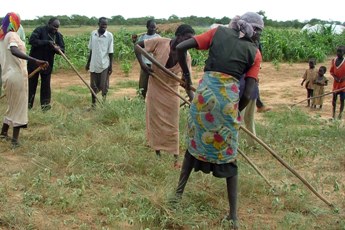U.S. kicks off agricultural program in South Sudan
May 17, 2010 (JUBA) – The U.S. Agency for International Development (USAID) inaugurated a $55 million program in the semi-autonomous region of South Sudan aimed at helping farmers there to develop their agricultural potential.

Furthermore, the Government of South Sudan (GoSS) has announced last Friday the lifting of taxes on food products in response to the looming hunger in the region.
USAID said that a five-year initiative, called the Food, Agribusiness, and Rural Markets (FARM) program, will initially focus on select counties in southern Sudan’s ‘green belt zone,’ which spans Western, Central, and Eastern Equatoria states, and where conflict destroyed much of the local capacity for agricultural production during Sudan’s civil war.
The USAID director Raj Shah arrived in Sudan last week where he toured Internally Displaced People (IDP) camps in Darfur and then travelled to Juba to launch FARM.
A team formed by the agency has conducted an assessment to explore options and priorities for expanding its agricultural and food security programming in Southern Sudan. The findings were used to come up with the FARM initiative.
It was estimated that agricultural potential is extremely high with about 90% of its total area considered suitable for agriculture, 50% of which is prime agricultural land. The soil and climate conditions were evaluated to be suitable for growing a wide variety of food and cash crops.
The project is to focus on commodities such as ground nuts, sorghum, rice, cassava, maize, sesame, tomatoes, cabbage, onion and okra. The areas covered in this program are comprised of Central Equatoria Counties: Morobo, Kajo Keji, Yei; Eastern Equatoria Counties: Magwi, Ikotos, Budi; Western Equatoria Counties: Maridi, Mundri, Tambura.
USAID director said that his agency will increase its presence in South Sudan in what appears to be a subtle preparation for the high probability of secession following the 2011 self-determination referendum in the region.
“All of that will require, as of today, more personnel and more resources, and that will only continue to increase really over the next 18 months,” Shah said. “I think you’ll see a big increase in numbers of people here.”
“Agriculture is the backbone of the economic development in southern Sudan, employing the majority of the population of more than 8 million, 80 percent of whom live in rural areas,” according to a USAID statement.
South Sudan is overwhelmingly dependent on oil revenue but some reports accused GoSS of mismanaging the money leading to persistence of food crisis and insecurity.
A GoSS official vowed to spend prudently in order to develop agriculture.
“There is going to be rationalization in all aspects of expenditure to create funds for the development of our agriculture,” the SPLM Secretary General Pagan Amum said.
(ST)

ojok s. ojok
U.S. kicks off agricultural program in South Sudan
this is good news for mr big poket. this money may not reach the right place.
Padiet Gagag
U.S. kicks off agricultural program in South Sudan
Southsudan gavernment icrease the problem of cillains by miss used the UAID. Many Agencies must be disappointed because,Goss failed to fulfilled their aimed that they gave money with it. must of them give their aids for the purpose not for unkown things like what has been done by Goss especially the leaders.